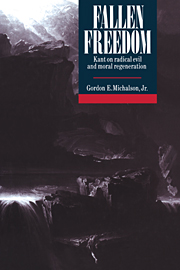Preface
Published online by Cambridge University Press: 15 December 2009
Summary
This book has its origins in embarrassment. The embarrassment was my own and would occur every year with uncanny regularity, as I taught the first semester of a year-long survey course in modern religious thought in the West. Invariably, as we worked through Kant's Religion within the Limits of Reason Alone, astute class members would ask questions such as the following: “What exactly is the difference between an ‘original predisposition’ to good and a ‘natural propensity’ to evil?” “If moral evil is produced by human freedom, why does Kant say it is ‘innate’?” “If moral evil is ‘radical’ in the way Kant says it is, how can human freedom get rid of it?” “If Kant is a Newtonian, why does he talk about ‘supernatural cooperation’ when he discusses moral regeneration?” “What exactly is the relationship between human freedom and divine grace in Kant's view of salvation?”
In response to such questions, I became very adept over the years at mumbling vague replies that skillfully alluded to the “profundity” of the Kantian teaching while also having the effect of redirecting my students' attention toward other parts of Kant's book, with which I was more comfortable and about which I had already written. As much at home as I was with certain of Kant's views, I frankly had no idea how to answer many of the questions that arose in connection with his theories of radical evil and moral regeneration.
- Type
- Chapter
- Information
- Fallen FreedomKant on Radical Evil and Moral Regeneration, pp. ix - xiiPublisher: Cambridge University PressPrint publication year: 1990



